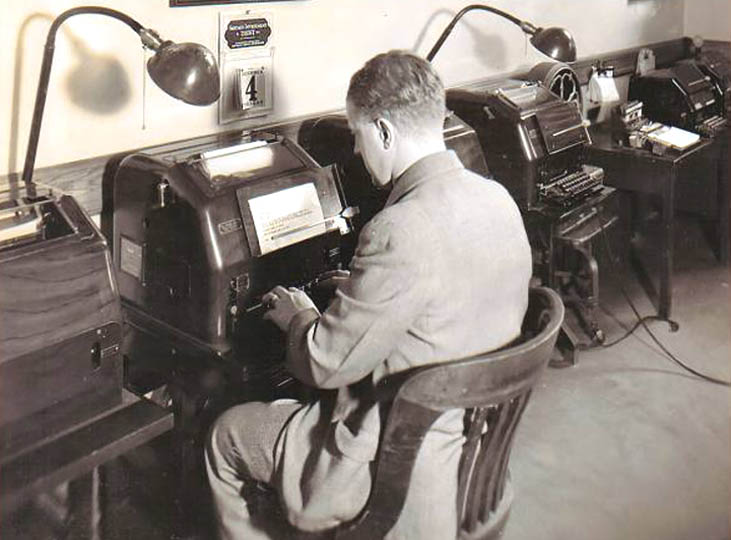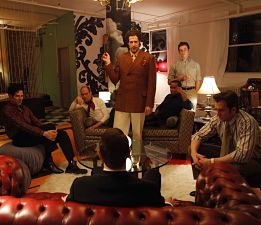The Guardian’s round-up of authors’ rules for writing fiction has been making the rounds for a couple weeks now. If you haven’t checked it out yet, it’s well worth it. Contributors include Geoff Dyer, Margaret Atwood, Sarah Waters, Neil Gaiman among others.
Zadie Smith shares ten rules too but leaves out a piece of advice I’ve seen her mention before and found useful. It’s from a 2008 talk on novel-writing she gave at Columbia, later published in The Believer:
My writing desk is covered in open novels. I read lines to swim in a certain sensibility, to strike a particular note, to encourage rigor when I’m too sentimental, to bring verbal ease when I’m syntactically uptight. I think of reading like a balanced diet; if my sentences are too baggy, too baroque, I cut back on fatty Foster Wallace, say, and pick up Kafka, as roughage. If I’m disappearing up my own aesthete’s arse, I stop worrying so much about what Nabokov would say and pick up Dostoyevsky, the patron saint of substance over style, a reminder to us all that good writing is more than elegant sentences.
I’ve started using this open-books-on-the-desk method too. Partly as inspiration and encouragement when I’m dragging, but also as a practical aid; a way to remind myself about the basics of construction and how writers accomplish simple things like getting a character to walk across a room (“he walked across the room”) or go outside (“she went outside”), which it’s easy to over-think (“he lumbered across the oak-floored palladium” “she hastened down the hallway, through the doorway, and out to the great outdoors”).
This reminds me of a time we were reading Evan Connell’s Mrs. Bridge in a writing class. There was a place in the book where the narrative skipped forward a year or so. O’Connell handled the jump this way: “Time passed.” No “the leaves fell, snow came and melted, and spring tripped in like a million ballerinas in a million long pink tutus.” Just “Time passed.” It blew our minds. That’s the sort of help the open books can offer. When I’ve gotten myself in a snarl it’s good to peek in one and be reminded that it can be that easy. Time passed. He walked across the room. She went outside. Stately, plump Buck Mulligan came from the stairhead, bearing a bowl of lather on which a mirror and a razor lay crossed.

 What I find most striking about this occurrence is the way in which it underlines the democratizing power of life in the digital age. Not only do I tweet, but I also receive “public” e-mail here and at my Wall Street Journal mailbox. Though I’m not able to keep up with it as consistently as I’d like, I always read my mail and do my best to answer every message that isn’t merely abusive. On top of that, Google Search makes it possible for me to know who writes about me on the Web and what they’ve written. As a result, I now have a fair number of in-person and Web-based friends whom I first “met” in cyberspace, and I expect I’ll make more in the future.
What I find most striking about this occurrence is the way in which it underlines the democratizing power of life in the digital age. Not only do I tweet, but I also receive “public” e-mail here and at my Wall Street Journal mailbox. Though I’m not able to keep up with it as consistently as I’d like, I always read my mail and do my best to answer every message that isn’t merely abusive. On top of that, Google Search makes it possible for me to know who writes about me on the Web and what they’ve written. As a result, I now have a fair number of in-person and Web-based friends whom I first “met” in cyberspace, and I expect I’ll make more in the future. I still feel that way, very much so. But I also need the same amount of silence in my life that I needed five years ago, the restorative, fertilizing silence that makes it possible for me to generate fresh ideas and refine old ones. Instead I’m getting less of it, and I know better than anyone that I’m my own problem, not to mention the only person who can fix it. Whether or not I can bring myself to pull the plug all the way out of the socket for two whole weeks is something else again, but I’m going to do my damnedest, and I suspect that Mrs. T will be right in there pitching as well.
I still feel that way, very much so. But I also need the same amount of silence in my life that I needed five years ago, the restorative, fertilizing silence that makes it possible for me to generate fresh ideas and refine old ones. Instead I’m getting less of it, and I know better than anyone that I’m my own problem, not to mention the only person who can fix it. Whether or not I can bring myself to pull the plug all the way out of the socket for two whole weeks is something else again, but I’m going to do my damnedest, and I suspect that Mrs. T will be right in there pitching as well. The Transport Group is presenting “The Boys in the Band” in a site-specific “environmental” production directed with taut fervor by Jack Cummings III, designed by Sandra Goldmark and set in an actual penthouse space in midtown Manhattan, with the 99 members of the audience scattered throughout the living room. The results are unnervingly intimate–the nine actors are in your lap all evening long–and so believable that you’ll flinch when the insults start flying….
The Transport Group is presenting “The Boys in the Band” in a site-specific “environmental” production directed with taut fervor by Jack Cummings III, designed by Sandra Goldmark and set in an actual penthouse space in midtown Manhattan, with the 99 members of the audience scattered throughout the living room. The results are unnervingly intimate–the nine actors are in your lap all evening long–and so believable that you’ll flinch when the insults start flying….